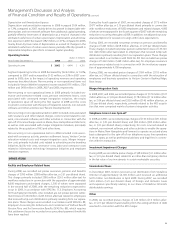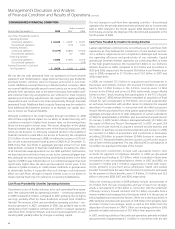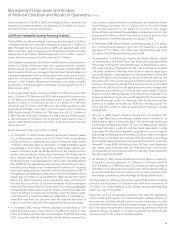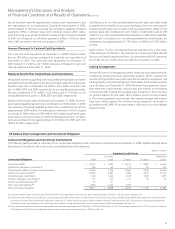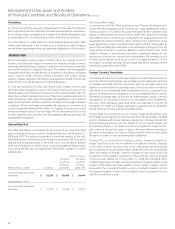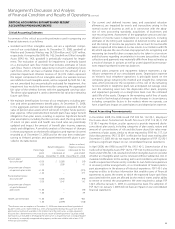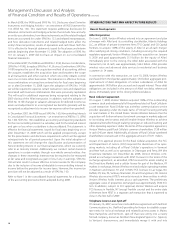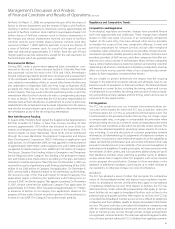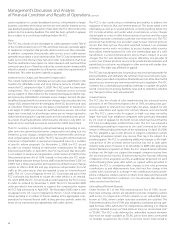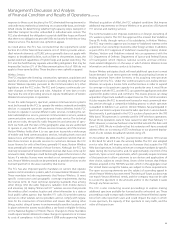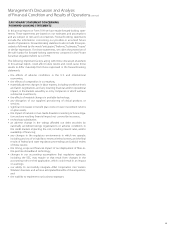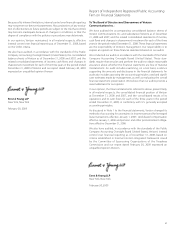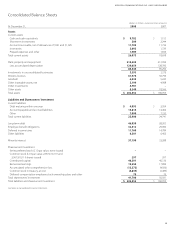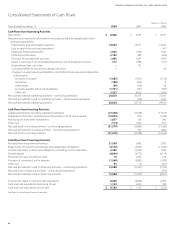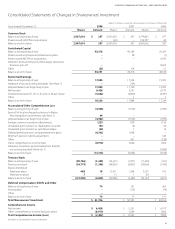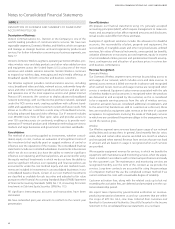Verizon Wireless 2008 Annual Report Download - page 34
Download and view the complete annual report
Please find page 34 of the 2008 Verizon Wireless annual report below. You can navigate through the pages in the report by either clicking on the pages listed below, or by using the keyword search tool below to find specific information within the annual report.carrier regulation to certain broadband services sold primarily to larger
business customers when those services are not used for Internet access
was deemed granted by operation of law when the FCC did not deny the
petition by the statutory deadline. The relief has been upheld on appeal,
but is subject to a continuing challenge before the FCC.
Video
The FCC has a body of rules that apply to cable operators under Title VI
of the Communications Act of 1934, and these rules also generally apply
to telephone companies that provide cable services over their networks.
In addition, companies that provide cable service over a cable system
generally must obtain a local cable franchise. The FCC has interpreted the
Cable Act to limit the franchise fees and other requirements that local
franchise authorities may impose on cable operators and has found that
some prior practices of franchise authorities constituted an unreasonable
refusal to award a competitive local franchise under the requirements of
federal law. This order has been upheld on appeal.
Interstate Access Charges and Intercarrier Compensation
The current framework for interstate access rates was established in the
Coalition for Affordable Local and Long Distance Services (CALLS) plan
which the FCC adopted on May 31, 2000. The CALLS plan has three main
components. First, it establishes portable interstate access universal
service support of $650 million for the industry that replaces implicit sup-
port previously embedded in interstate access charges. Second, the plan
simplifies the patchwork of common line charges into one subscriber line
charge (SLC) and provides for de-averaging of the SLC by zones and class
of customers. Third, the plan set into place a mechanism to transition to
a set target of $.0055 per minute for switched access services. Once that
target rate is reached, local exchange carriers are no longer required to
make further annual price cap reductions to their switched access prices.
As a result of tariff adjustments which became effective in July 2003, vir-
tually all of our switched access lines reached the $.0055 benchmark.
The FCC currently is conducting a broad rulemaking proceeding to con-
sider new rules governing intercarrier compensation including, but not
limited to, access charges, compensation for Internet traffic and recip-
rocal compensation for local traffic. The FCC has sought comments about
intercarrier compensation in general and requested input on a number
of specific reform proposals. On November 5, 2008, the FCC issued
an order on remand relating to intercarrier compensation for dial-up
Internet-bound traffic. In April 2001, the FCC had found that this traffic
is not subject to reciprocal compensation under Section 251(b)(5) of the
Telecommunications Act of 1996. Instead, in that order, the FCC estab-
lished federal rates per minute for this traffic that declined from $.0015 to
$.0007 over a three-year period, and required incumbent local exchange
carriers to offer to both bill and pay reciprocal compensation for local
traffic at the same rate as they are required to pay on Internet-bound
traffic. The U.S. Court of Appeals for the D.C. Circuit rejected part of the
FCC’s rationale, but declined to vacate the order while it is on remand.
On July 8, 2008, the D.C. Circuit issued an order requiring the FCC to issue
its order on remand by November 5, 2008. The FCC’s November 2008
order provided a new rationale to support the compensation regime
the FCC had announced in April 2001. The November 2008 order is now
on appeal to the U.S. Court of Appeals for the D.C. Circuit. Disputes also
remain pending in a number of forums relating to the appropriate com-
pensation for Internet-bound traffic during previous periods under the
terms of our interconnection agreements with other carriers.
32
Management’s Discussion and Analysis
ofFinancialConditionandResultsofOperations continued
The FCC is also conducting a rulemaking proceeding to address the
regulation of services that use Internet protocol. The issues raised in the
rulemaking as well as in several petitions currently pending before the
FCC include whether, and under what circumstances, access charges
should apply to voice or other Internet protocol services and the scope
of federal and state commission authority over these services. The FCC
previously has held that one provider’s peer-to-peer Internet protocol
service that does not use the public switched network is an interstate
information service and is not subject to access charges, while a service
that utilizes Internet protocol for only one intermediate part of a call’s
transmission is a telecommunications service that is subject to access
charges. The FCC also declared the services offered by one provider of
a voice over Internet protocol service to be jurisdictionally interstate and
stated that its conclusion would apply to other services with similar char-
acteristics. This order was affirmed on appeal.
The FCC also has adopted rules for special access services that provide for
pricing flexibility and ultimately the removal of services from price regu-
lation when prescribed competitive thresholds are met. More than half of
special access revenues are now removed from price regulation. The FCC
currently has a rulemaking proceeding underway to update the public
record concerning its pricing flexibility rules and to determine whether
any changes to those rules are warranted.
Universal Service
The FCC also has a body of rules implementing the universal service
provisions of the Telecommunications Act of 1996, including rules gov-
erning support to rural and non-rural high-cost areas, support for low
income subscribers and support for schools, libraries and rural health
care. The FCC’s current rules for support to high-cost areas served by
larger“non-rural”localtelephonecompanieswerepreviouslyremanded
by U.S. Court of Appeals for the Tenth Circuit, which had found that the
FCC had not adequately justified these rules. The FCC has initiated a
rulemaking proceeding in response to the court’s remand, but its rules
remain in effect pending the results of the rulemaking. On April 29, 2008,
the FCC adopted a cap on the amount of support competitive carriers
(including all wireless carriers) may receive. That cap is the subject of a
pending appeal. The FCC is considering additional changes to the high-
cost portion of the universal service fund but has not to date taken
industry-wide action. However, in its November 4, 2008 order approving
Verizon Wireless’s acquisition of Alltel, the FCC required Verizon Wireless
to phase out the high-cost support the merged company receives from
the universal service fund by 20 percent during the first year following
completion of the acquisition and by an additional 20 percent for each
of the following three years, after which no support will be provided. In
addition, the FCC is considering other changes to the rules governing
contributions to, and disbursements from, the fund. Any change in the
current rules could result in a change in the contribution that local tele-
phone companies, wireless carriers or others must make and that would
have to be collected from customers, or in the amounts that these pro-
viders receive from the fund.
Unbundling of Network Elements
Under Section 251 of the Telecommunications Act of 1996, incum-
bent local exchange carriers are required to provide competing carriers
with access to components of their network on an unbundled basis,
known as UNEs, where certain statutory standards are satisfied. The
Telecommunications Act of 1996 also adopted a cost-based pricing stan-
dard for these UNEs, which the FCC interpreted as allowing it to impose
apricingstandardknownas“totalelementlongrunincrementalcost”
or“TELRIC.”TheFCC’srulesdefiningtheunbundlednetworkelements
thatmustbe made availableatTELRICpriceshavebeen overturned
on multiple occasions by the courts. In its most recent order issued in



